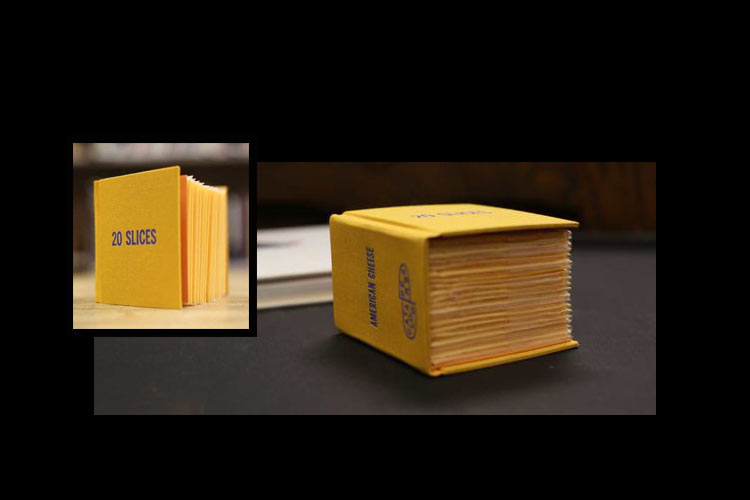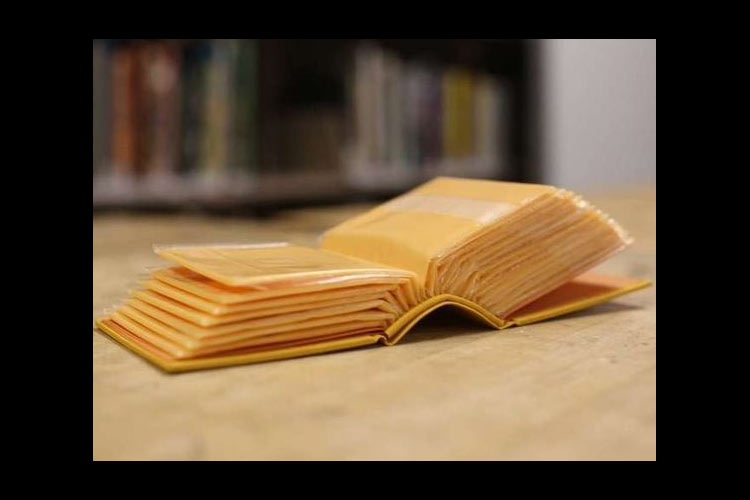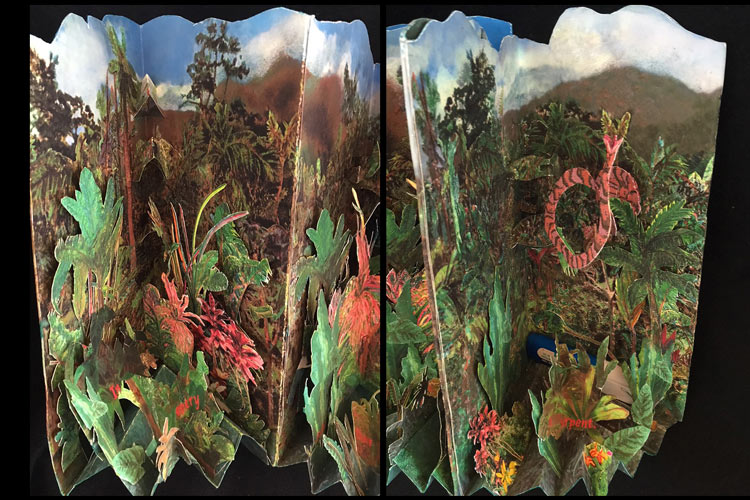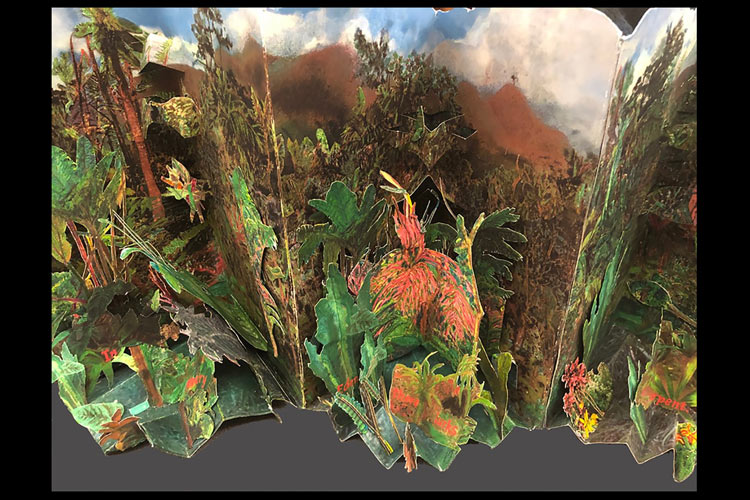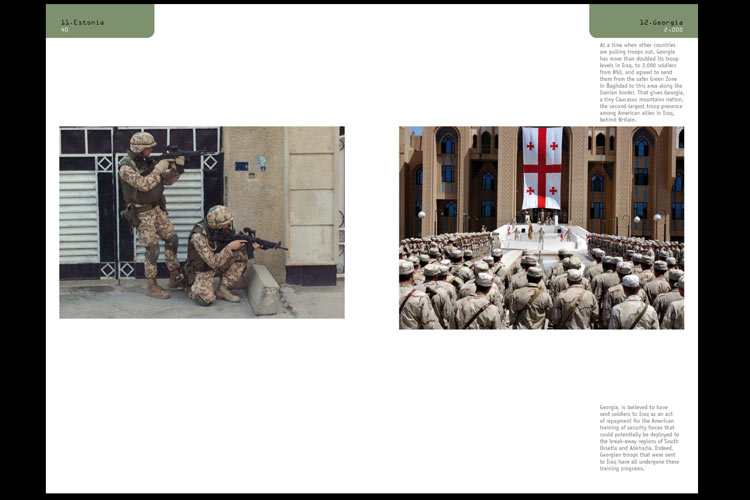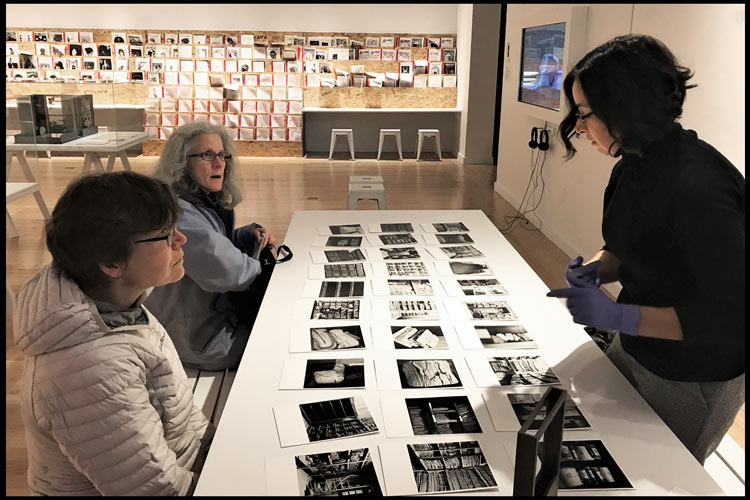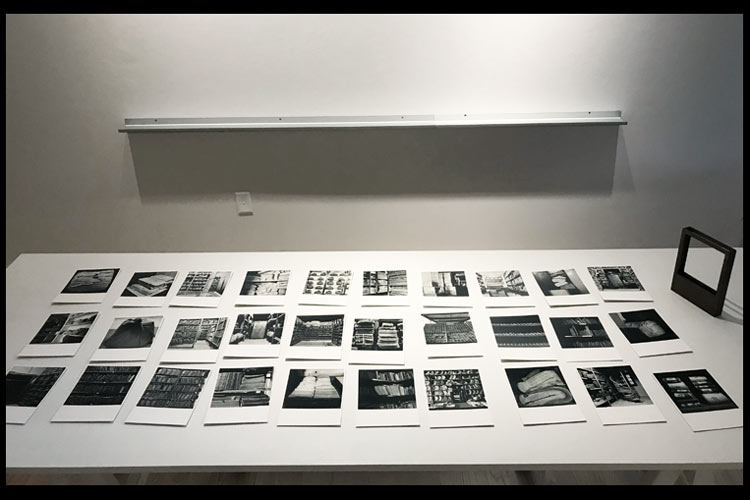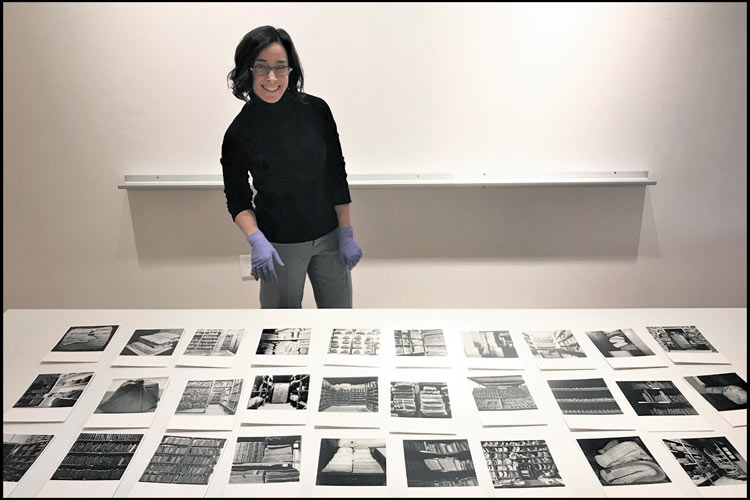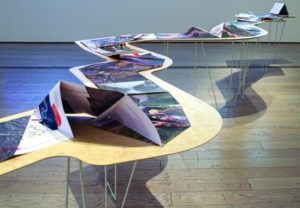 On November 13, 2019, Marie Canaves, Suzette Durso, and Susan Marsh went on NEBA’s very first field trip to see Bookworks. The show was on view at the Tufts University Art Galleries in Medford (August 22 – December 15, 2019) and had been highly recommended to us by Cristina Hajosy, as she had found it to be not only aesthetically and intellectually engaging, but also comprehensive in scope. The show included a presentation of historical pieces dating from the medieval period to the present. There were four themes around which the show was organized: materiality, sequencing, communication, and gathering.
On November 13, 2019, Marie Canaves, Suzette Durso, and Susan Marsh went on NEBA’s very first field trip to see Bookworks. The show was on view at the Tufts University Art Galleries in Medford (August 22 – December 15, 2019) and had been highly recommended to us by Cristina Hajosy, as she had found it to be not only aesthetically and intellectually engaging, but also comprehensive in scope. The show included a presentation of historical pieces dating from the medieval period to the present. There were four themes around which the show was organized: materiality, sequencing, communication, and gathering.
![]()
We were drawn to the variety of works featuring traditional materials and methods. But equally captivating were some delightfully inventive and unorthodox pieces such as Ben Denzer’s, 20 Slices of American Cheese (2018) in which the slices were bound together for “literary consumption”.
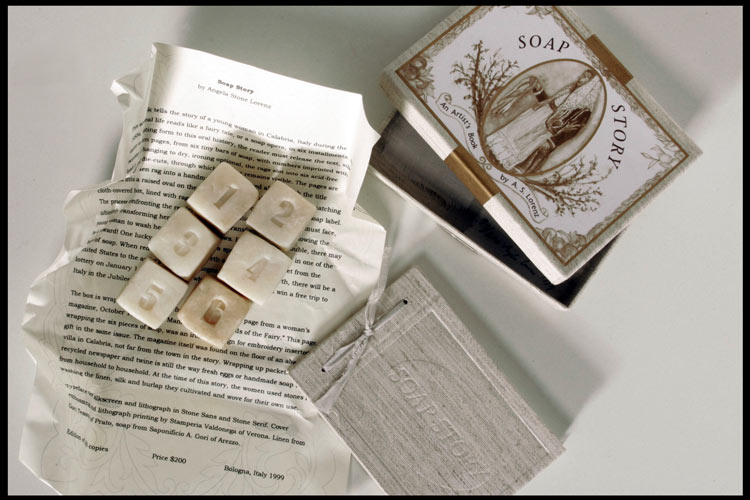
Angela Lorenz’s Soap Story (1999) made out of small bars of soap embedded with a six-part novel which can only be unfurled as people wash their hands.
The exhibition held special meaning for us however, as the works of two of our members – Laura Blacklow and Chantal Zakari – were on view.
Laura Blacklow’s, Uncovering Eden, 8×8.25”, is a shaped, digitally-printed pop-up book for adults. This small, intricately-designed piece presents us with a dense and luxuriant tropical jungle under a blue, cloud-filled sky. The jungle is so dense in fact, that viewers have to take a very close, very careful look to fully appreciate it. The foreground vibrates with a rich variety of flora differentiated by scale, color, and shape. Plants in various shades of greens dominate the scene; but there are red ones as well, with areas of brilliant yellows and oranges that accentuate the surrounding beauty. Within this exotic realm teeming with life, the following words are separately interspersed, In Every Eden There Lurks a Serpent. This sobering observation is given concrete form in the middle-ground of the book, where the richness in coloration and exuberance of shape give way to an unmistakable sense of decay suggested by the drooping, brown foliage and mountains in the distance. This is a compelling, philosophical piece about the innate evil that informs even the best of worlds. It’s part of the Tufts University Artist’s Book Collection.
To find out more about Laura Blacklow’s work visit https://laurablacklow.com/
Chantal Zakari’s and Mike Mandel’s They Came to Baghdad, 6″ x 9″, published by Eighteen Publication, is an arresting photo-book chronicling occupation, destruction, and death in Iraq. Its title mirrors that of Agatha Christie’s novel of diplomatic adventure and romantic intrigue. Translated into over 30 languages, Zakari and Mandel have incorporated Christie’s 40 different book covers in their book which are paralleled by the text and images of the 40 countries in the Multi-National Force which deployed troops to Iraq. Their book was inspired by the devastating car bomb (2007) detonated in the heart of Baghdad’s historic book-selling center: Al-Mutanabi Street. On their website, the artists explain, This book is a response to The Al-Mutanabbi Street Coalition’s call for 130 book artists to ‘re-assemble’ some of the ‘inventory’ of the reading material that was lost in the car bombing”. Their response is both profound and riveting. Stark images of armed soldiers on the streets, of people mourning, of joyful reunions, form a marked contrast to impersonal charts illustrating the geographic origin of foreign commercial activity, or low-brow book cover designs made for Christie’s novel. They Came to Baghdad is the kind of book that – through its use of text and imagery – engages viewers not only on an intellectual and emotional level, but on an aesthetic one as well, and encourages thoughtful assessment of Iraq’s often troubled history. The book is carried by Printed Matters in New York and is in the collection of major museums including Tufts University Artist’s Book Collection.
To find out more about Zakari and Mandel’s book visit https://www.thecorner.net/they-came-to-baghdad?p=1

The last part of our adventure involved the “book activation” – a lunch-time program in which Liz Cantor, Tufts University Art Galleries Curator of Education, chose a different book to highlight every week. The one she took out for us was an object called Pothi Box, by Dayanita Singh, published in an edition of 360 by Spontaneous Press.
It was originally wrapped with cloth, like a bundle. In this unbound book, 30 black and white numbered image cards picture all manner of objects such as film canisters, or piles upon piles of paper, or bundled files. The cards were contained in an unusual, wooden “box” which had a window-like opening on the front and a slot at the top into which the picture cards were inserted. The cards could be re-arranged in any order at will; it was easy – only requiring that the selected image be inserted into the slot. However, they were never to be separated either from one another or from their container.
On her website, Singh provided specific instructions for acquiring Pothi Box saying it should be taken …directly off the wall. In this way the exhibition disappears with time and when all the boxes are sold, the edition and exhibition are over. The whole premise of the work was fascinating, and we were thrilled that Liz regaled us with this special treat.
To find out more about Singh’s book visit http://dayanitasingh.net/pothi-box/
Tufts University Art Galleries
40 Talbots Avenue, Medford, MA
To learn more about Bookworks, visit https://artgalleries.tufts.edu/blog/news/2019/04/07/548/
![]()
